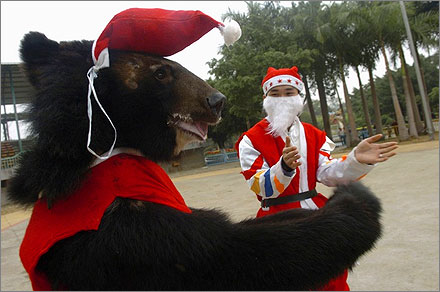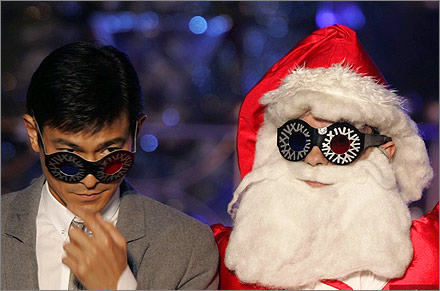« November 2007 | HOME PAGE | January 2008 »
December 25, 2007
Merry Christmas, China.





posted December 25, 2007 at 08:05 AM unofficial Xinjiang time | Comments (42)
December 14, 2007
Obscure China Fact of the Day

Xinhua — the only source I trust for facts of any sort these days — informed me recently that:
More than 85 percent of China's 1.3 billion people use three-character names. People with two-character names are the second most common, comprising more than 160 million, or 14.22 percent of the population.
No, that's not the fact of the day. Boring! I think you'll all agree with me that three-character names are soooo Ming Dynasty. (Don't even get me started on all those two-character brats born after 1980.) No, if you want to be hip in today's modern China, you'll need to think about using at least four characters... which is exactly why Xinjiang (once again) rocks so friggin' hard:
Nearly 1,000 people [in China] have names with ten or more characters, and 97 percent of them live in the western Xinjiang Autonomous Region.
Take that... uh, Tibet! Inner Mongolia? Nothing quite rolls of the tongue in Mandarin like the eight syllables of Sīmǎyì Tiělìwà'ěrdì, which is how Xinjiang chairman Ismail Tiliwaldi would be greeted at the Great Hall of the People in Beijing. (Uyghurs are always disrupting the otherwise perfect aural fengshui at Party meetings.)
The full Xinhua article is below. Oh, and by the way... the article also mentions that somewhere out there loose on the streets of the Middle Kingdom exists a Han Chinese nutter with a 15-character name. What the hell is up with that?!
Name game: most Chinese use 3 characters, some use 10 or more
12 December 2007
Xinhua News Agency
(c) Copyright 2007 Xinhua News Agency
BEIJING, Dec. 12 (Xinhua) -- A Ministry of Public Security affiliate has released a survey showing that more than 85 percent of China's 1.3billion people use three-character names.
People with two-character names are the second most common, comprising more than 160 million, or 14.22 percent of the population, the National Citizen Identity Information Center (NCIIC) found, according to a report in the China Youth Daily on Wednesday.
More than 1.97 million people have names of more than four characters, the newspaper said.
The longest name found among Han Chinese, who account for 90 percent of Chinese nationals, reaches 15 characters, the NCIIC said. Nearly 1,000 people have names with ten or more characters, and 97 percent of them live in the western Xinjiang Autonomous Region.
In June, the Ministry of Public Security released a draft rule on choosing and registering names. In the draft rule, which is open to public comment, the ministry advises individuals to use their parents' surnames, either singly or in combination.
The draft also encourages people to choose names of three to five characters and rules out the use of foreign alphabets, Arabic numerals, symbols and personalized images. Applications to register names using a banned symbol would be denied by the citizen's affairs administration.
Although they attempt to limit Han Chinese names to six characters, regulations allow ethnic minorities to use longer names in their native languages and transliterations in Chinese. The latter are required for formal documents.
Recent demographic surveys indicate there are about 1,600 surnames, with only 100 or so being frequently used, among Chinese nationals, which means many people share a name. For example, nearly 300,000 people, male and female, use the same common name of Zhang Wei, the statistics show.
Du Peng, a population specialist at the Beijing-based Renmin University of China, said that giving newborns a combined surname from their parents could help solve the problem of widely recurring names.
"Theoretically speaking," Du said, "permutations and combinations of the existing 1,600 surnames could produce 1.2 million surnames."
posted December 14, 2007 at 01:02 PM unofficial Xinjiang time | Comments (53)
